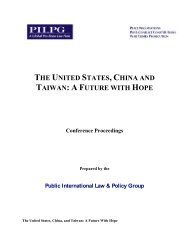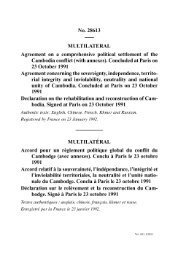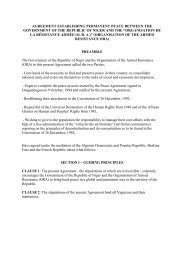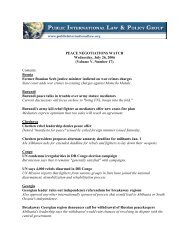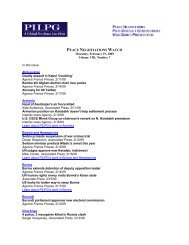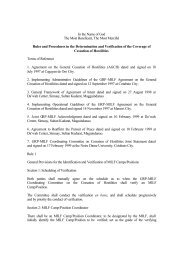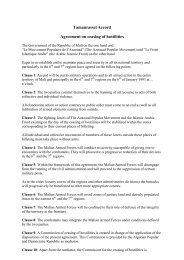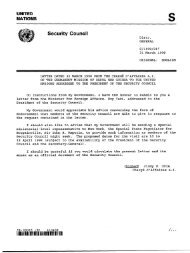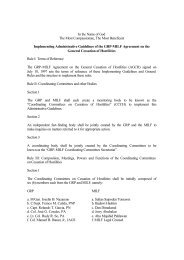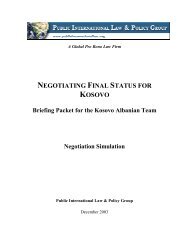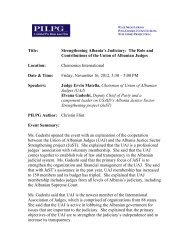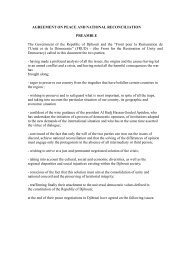You also want an ePaper? Increase the reach of your titles
YUMPU automatically turns print PDFs into web optimized ePapers that Google loves.
8<br />
skill of Steiner and the Kosovo leaders and on whether they can move jointly to attack the<br />
most pressing problems.<br />
It seems likely that one of the consequences of the crisis over forming a government<br />
could be a realignment of the Kosovo Albanian political scene. The crisis may also open<br />
up some political space for new political personalities to replace or supplement the three<br />
leaders of Rugova, Thaci, and Haradinaj who have dominated the Kosovo Albanian<br />
political stage since the 1999 war. Changes in the current Kosovo Albanian party<br />
structure could be desirable since all of the three major parties define themselves mainly<br />
over their leaders and the way they address the past.<br />
Dr. Bujar Bukoshi, the Prime Minister of the LDK-led Kosovo Albanian parallel state in<br />
the 1990s, confirmed to me his intention to launch a new political party in the near future.<br />
Bukoshi, who did not bother to conceal his disdain for Rugova, thought his party would<br />
attract the support of a considerable number of LDK voters—and of some LDK delegates<br />
in the Assembly—as well as of non-voters in the 2001 election.<br />
The government crisis also caused a resurgence of rumors about a split within the PDK<br />
between backers of Thaci and party leaders with ties to other regions and factions within<br />
the ex-KLA. If the relatively moderate Rexhipi gains in stature through his performance<br />
as Prime Minister, such strains could increase. Dissatisfaction with Rugova continues to<br />
fuel speculation of a split within the LDK but those who might like to get out from under<br />
Rugova's leadership are handicapped by the absence of any alternatives within the LDK<br />
with the stature to stand separately from Rugova.<br />
A reshuffling of the Kosovo Albanian political party alignment structure might lead<br />
eventually to the emergence of new and in some cases younger political figures. Adem<br />
Demaci—still respected because of his 30 years imprisonment and often capable of<br />
surprising moderation—told me he intends to return to the political scene once the<br />
current crop of leaders have come to their—in Demaci's eyes, inevitable—end. Albin<br />
Kurti, a prominent student leader in the 1990s who wears a martyr's halo because of his<br />
three years imprisonment by the Serbs, is highly intelligent and hosts a weekly public<br />
affairs TV show, which keeps him in the public eye and gives him an excellent finger on<br />
the political pulse of Kosovo. And there are always the prominent Albanian political<br />
intellectuals, such as Veton Surroi, Blerim Shala, and Shkelzen Maliqi, who might<br />
someday return to the political scene where they were prominent in the 1990s.<br />
In a meeting with me before the crisis was resolved, Rugova told me that his first priority<br />
as president would be independence and his second would be revitalization of the<br />
economy through foreign investment and privatization. (On Rugova and independence<br />
see the "Future Status" section below.) Rugova said he intended to be an active and<br />
visible president, communicating often with the Kosovo people and seeking thereby to<br />
lead them peacefully toward independence and democracy. Somewhat enigmatically, he<br />
said he would use a clause in the Constitutional Framework which makes the president<br />
the guarantor of the democratic functioning of the system to expand the role of the



